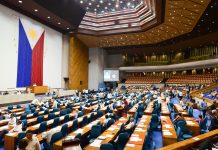[av_one_full first min_height=” vertical_alignment=” space=” custom_margin=” margin=’0px’ padding=’0px’ border=” border_color=” radius=’0px’ background_color=” src=” background_position=’top left’ background_repeat=’no-repeat’ animation=”]
[av_heading heading=’Legarda: US pullout from Paris deal ‘grave mistake’’ tag=’h3′ style=’blockquote modern-quote’ size=” subheading_active=’subheading_below’ subheading_size=’15’ padding=’10’ color=” custom_font=”]
BY PRINCE GOLEZ
[/av_heading]
[av_textblock size=” font_color=” color=”]
Wednesday, June 7, 2017
[/av_textblock]
[av_textblock size=” font_color=” color=”]
MANILA – A “climate denier” was how Philippine senator Loren Legarda described United States President Donald Trump, whose country pulled out from a landmark deal addressing climate change.
Trump announced that the United States was leaving the Paris Agreement, which he claimed stands to adversely affect their economy.
Abandoning the Paris deal was a “grave mistake” and posed “significant” climate risks, said Legarda, chairwoman of the Senate committees on climate change, finance and foreign relations.
“By this withdrawal, the United States has turned its back on the future,” she said. “It puts a spotlight on a belligerent leadership that refuses to heed the voices of people, including his own, who are gravely threatened by the perils of climate change and global warming.”
The senator said she was appalled that some people, including Trump, reject the dangers of climate change.
According to Legarda, the sea level rise resulting from global warming threatens to submerge small island nations like Kiribati, Marshall Islands and the Maldives.
Around 20 percent of the global population — 1.3 billion people — live in areas that may be directly affected by sea level rise, she added.
In the Philippines, 64 coastal provinces, 822 coastal municipalities, 25 major coastal cities, and approximately 13.6 million Filipinos are “exposed to greater risks of flooding.”
Ocean acidification may also permanently damage coral reefs, Legarda said.
With global warming of up to 2 degrees Celsius, 98 percent of coral reefs will die by 2050, a World Bank study showed, and this may decrease fish capture by 50 percent in southern Philippines.
Moreover, extreme weather events “have brought so much destruction and claimed so many lives already,” said Legarda. “In the Philippines, we have experienced the wrath of typhoons ‘Frank,’ ‘Ondoy,’ ‘Sendong,’ ‘Pablo,’ and ‘Yolanda,’ among many others.”
Even the US was not spared — hurricanes Katrina and Sandy in 2005 and 2012, respectively, caused major damage and displacement — she said.
“Climate change knows no boundaries. It affects us all. It will make the poor poorer, create more climate refugees, and greatly affect the vulnerable — children, women, elderly, persons with disabilities, and indigenous peoples,” said Legarda./PN
[/av_textblock]
[/av_one_full]






